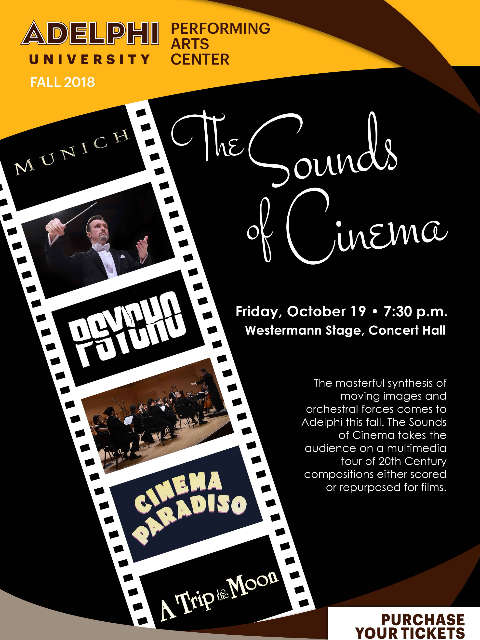CONCERT OF CSO "SOUNDS OF CINEMA" IN THE ADELPHI UNIVERSITY CONCERT HALL, NY
Oct. 19, 2018

On 19 October 2018, Maestro Vladimir Gorbik made his USA conducting debut at Adelphi University in Garden City, NY with the New York branch of the Capital Symphony Orchestra, an ensemble whose main branch was founded in Moscow in 2017. This chamber ensemble comprised 21 players: 19 string instruments, plus a pianist and percussionist. In an hour-long concert, they performed mostly musical film scores; the film excerpts were projected on a screen as they played. Three pieces—A Trip to the Moon by Luke Sullivan (for a three-minute-long clip from the whimsical 1902 French silent film Le Voyage dans la Lun by Georges Méliès), Alice in Wonderland by Kevin Lubin (for the first half of the 1903 silent film by Cecil Hepworth and Percy Stow), and Pulse by Nicholas Reeves (a selection of short clips from near the end of the famous 1923 silent film The Hunchback of Notre Dame with Lon Chaney)—were excellent original compositions for this concert. Sullivan’s music was suitably light and witty, while Lubin’s playfully captured the absurdity of Alice’s adventures; both were written in a conservative tonal vein. By contrast, Reeves’s music combined dissonant tonal and atonal idioms with great effectiveness to portray the gothic horror surrounding Quasimodo, Esmerelda, and the evil Jehan. Other works were Samuel Barber’s Adagio for Strings (accompanying a film montage of environmental disasters by Adelphi student Julio Ulloa, Jr.), John Williams’s A Prayer for Peace (from the 2005 film Munich), the theme music for Ennio Morricone’s Cinema Paradiso (from 1988), Henry Mancini’s song Moon River (arranged by Peter Martin from the 1961 film Breakfast at Tiffany’s), and selected scenes from Bernard Herrmann’s Psycho (arranged by John Mauceri from the famous 1960 Alfred Hitchcock film). Under Maestro Gorbik’s firm, skillful direction the instrumentalists played with great precision, unanimity, and expressivity, with warm string tone, even in the extremely difficult music for Pulse. His beat was clear and free from exaggeration, which ensured rhythmic exactitude; his choice of tempos tended to be on the brisk side. It was especially a pleasure to hear the works by Barber, Williams, Morricone, and Mancini played with complete freedom from artificial sentimentality. This was an auspicious debut for all concerned; one looks forward enthusiastically to the prospect of future concerts under Maestro Gorbik’s direction. James A. Altena, Associate Editor, Fanfare magazine, USA

